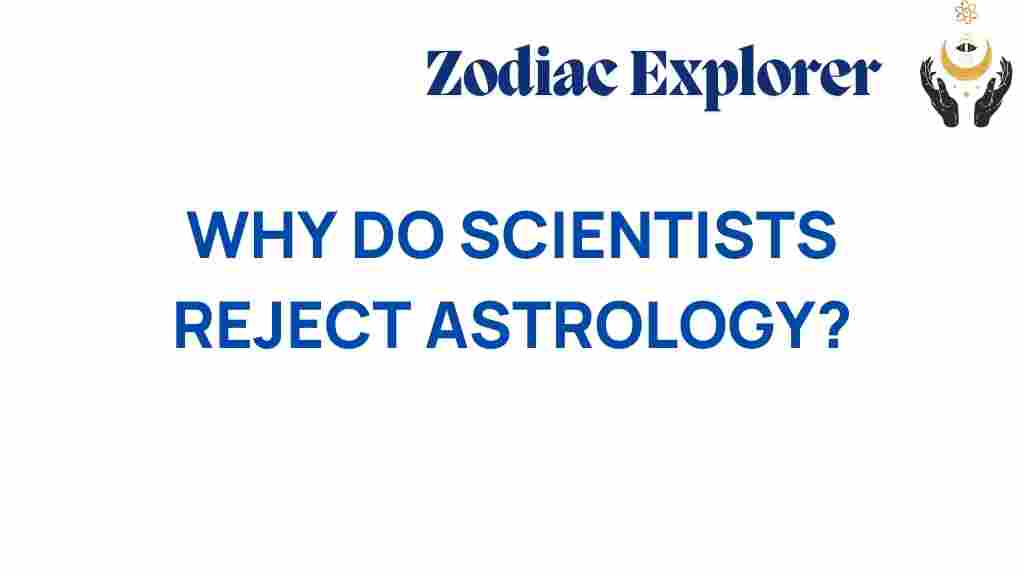Unraveling the Skepticism: Why Scientists Reject Astrology
Astrology has been a topic of intrigue and debate for centuries, captivating millions with its promises of insight into personality, relationships, and destiny based on celestial positions. However, within the scientific community, skepticism reigns supreme. This article delves into the reasons why scientists reject astrology, exploring the intersection of astrology, science, belief systems, and psychology.
Understanding Astrology: A Brief Overview
Astrology is the study of the movements and relative positions of celestial bodies, interpreted in relation to human affairs and natural phenomena. It encompasses various systems, including Western astrology, Vedic astrology, and Chinese astrology, each with its unique methodologies and interpretations.
Despite its popularity, astrology lacks empirical evidence, which is a cornerstone of scientific inquiry. The distinction between belief systems and scientific principles is crucial in understanding the skepticism surrounding astrology.
The Roots of Skepticism in Science
Scientific skepticism arises from a commitment to evidence-based reasoning. Here are key reasons why the scientific community questions astrology:
- Lack of Empirical Evidence: Astrology fails to provide verifiable evidence that celestial bodies influence human behavior or events on Earth.
- Falsifiability: Scientific theories must be falsifiable. Astrology does not meet this criterion, as its predictions often lack specificity.
- Controlled Studies: Numerous studies have tested astrological claims under controlled conditions, consistently finding no correlation between astrological predictions and actual outcomes.
Astrology and Empirical Evidence
The scientific method is predicated on the collection of empirical evidence. In contrast, astrology relies on anecdotal data and subjective interpretations. Let’s explore the significance of empirical evidence in the debate surrounding astrology:
The Role of Empirical Evidence in Science
Empirical evidence is obtained through observation and experimentation. Here’s how it contrasts with astrology:
- Objective Measurements: Science demands objective measurement and repeatability. Astrological claims are often vague and open to interpretation.
- Peer Review: Scientific findings undergo rigorous peer review, whereas astrology lacks a formal process for validating claims.
- Predictive Power: Scientific theories possess predictive power that can be tested. Astrology often provides generalized statements that could apply to anyone.
Psychological Factors Influencing Belief in Astrology
Despite the absence of scientific backing, astrology remains popular. Understanding the psychological factors that contribute to belief in astrology can shed light on its cultural impact:
Cognitive Biases and Astrology
Several cognitive biases contribute to the appeal of astrology:
- Confirmation Bias: Individuals tend to remember instances when astrological predictions were accurate while ignoring failures.
- Barnum Effect: People find vague and general statements personally meaningful, leading them to believe in astrological insights.
- Desire for Control: Astrology provides a sense of control and understanding in an unpredictable world.
The Social Aspect of Belief Systems
Astrology often serves as a social tool. People discuss their horoscopes and astrological signs, fostering connections. This social aspect can reinforce belief in astrology:
- Community Engagement: Many find a sense of belonging within astrological communities.
- Shared Experiences: Discussing astrological signs can lead to shared narratives and experiences, further solidifying belief.
The Cultural Impact of Astrology
Astrology’s cultural impact is profound, influencing literature, art, and even politics. Its integration into popular culture has perpetuated its relevance:
Astrology in Popular Culture
From horoscopes in newspapers to astrology-themed apps, astrology permeates modern life:
- Media Representation: Astrology is frequently featured in lifestyle sections of magazines and online platforms.
- Celebrity Influence: Many celebrities openly discuss their astrological signs, attracting followers.
- Astrology Apps: Technology has made astrology more accessible, allowing users to explore their signs and compatibility.
Astrology Debates: Scientists vs. Astrologers
Debates between scientists and astrologers often arise, highlighting the clash between empirical science and belief systems:
Common Arguments in Astrology Debates
Here are some common arguments from both sides:
- Astrologers: Claim that astrology offers valuable insights into personality and life events.
- Scientists: Argue that without empirical evidence, astrology cannot be taken seriously as a science.
- Astrologers: Suggest that science is limited in understanding complex human experiences.
- Scientists: Emphasize the importance of evidence and predictive accuracy.
Resolving the Divide
While debates may seem unresolvable, fostering open dialogue can help bridge the gap:
- Education: Promoting scientific literacy can help individuals critically evaluate astrological claims.
- Understanding Psychology: Recognizing psychological factors behind belief can lead to more constructive discussions.
- Respectful Engagement: Approaching discussions with respect can reduce defensiveness and promote understanding.
Troubleshooting Your Understanding of Astrology
If you find yourself drawn to astrology but are unsure about its validity, consider the following troubleshooting tips:
- Research: Explore scientific literature on astrology’s effectiveness and the psychological factors influencing belief.
- Critical Thinking: Apply critical thinking skills when evaluating astrological claims. Ask yourself if the evidence presented is empirical.
- Discussion: Engage in discussions with both astrologers and skeptics to gain a balanced perspective.
Conclusion: The Ongoing Conversation
Astrology remains a fascinating subject, intertwined with human psychology and cultural significance. While the scientific community largely rejects astrology due to a lack of empirical evidence and its failure to meet scientific standards, the belief persists. Understanding the psychological and cultural factors that contribute to this belief can lead to more meaningful conversations about astrology.
As we navigate this ongoing debate, it’s essential to respect differing beliefs while advocating for scientific literacy. For those interested in exploring scientific perspectives on astrology, further reading can be found in this resource. Ultimately, unraveling the skepticism surrounding astrology requires a balance of open-mindedness and critical thinking.
This article is in the category Myths and created by ZodiacExplorer Team
